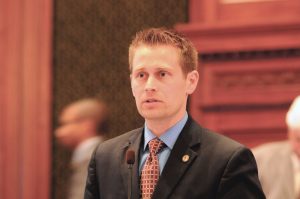Should state allow 12-year-olds to be home alone?
By Grant Morgan Capitol News Illinois — March 15, 2019
State Rep. Joe Sosnowski (R-Rockford) is shown here in the file photo speaking on the House floor at the Capitol in Springfield. (Credit: Joesosnowski.org)
SPRINGFIELD — At what age should it be legal for a child to be at home alone, or to be caring for younger siblings?
In Illinois, it’s currently 14, the strictest such law in the nation for more than 25 years.
One Republican lawmaker wants that changed to 12.
“This law came into place decades ago in response to a case where a couple left the country with their two children at home,” said Rep. Joe Sosnowski, of Rockford. “As it sometimes happens with these issues in legislatures, lawmakers overreact and set a precedent that’s too restrictive.”
Sosnowski is sponsoring House Bill 2334, which would lower the state’s legal age limit for leaving children unsupervised to 12. The bill passed unanimously out of the House Judiciary-Criminal Committee in early March.
The case on which Illinois’ law is formed involved a St. Charles couple who left their 9- and 4-year-old girls at home to vacation in Mexico in 1992. Two days into the trip, a fire alarm went off, and the children went to a neighbor’s house for help before later being picked up by child welfare agents.
A year later, the state passed the law considering it neglect if a child is left with someone under the age of 14.
“By changing it to 12, we’re creating a little more flexibility for parents to be able to decide and be responsible for their own children, based on a child’s responsibility level,” Sosnowski said.
Some states have no legal restrictions, while others, like Kansas (6) and North Carolina (8), set the age much lower. No other state has a legal age of older than 12.
“Parents leave children home alone for various reasons,” said Jimmie Whitelow, spokesman for the Illinois Department of Children and Family Services. “The question is, how long do you leave a child of any age home alone? Whether a child is 14, 12, 8 or 6, does that child have the capacity to properly care for themselves should an emergency occur?”
Sosnowski admits many parents don’t know of Illinois’ law, and don’t follow it even if they do. He added that negative comments about the bill have been “few and far between,” and most parents are supportive, readily admitting to having started babysitting when they were younger than 14.
“So if you have a mature 12-year-old who has a cellphone, is very responsible and CPR-certified,” Sosnowski said, “there are families that are happy to let that child babysit or be at home for a period of time without any real concern.”
It’s not clear how many Illinois parents are prosecuted for violating the current law. According to Matt Jones, associate director of the Illinois Appellate Prosecutor’s office, there is no easily accessible repository for such information.
But, Jones said, prosecutors are “pretty wise in exercising judgment about these cases.”
“If you leave your 12-year-old at home while you run to the store, that’s probably not going to end up with having your kids taken away or a criminal charge. If you’re gone for a month, then probably you’re going to be charged,” Jones said.
The case of a Wilmette mother who was investigated by the Illinois Department of Children and Family Services after letting her 8-year-old child walk their dog around the block sparked news coverage in mid-2018, but prosecutors did not pursue the case.
But, according to the Chicago Tribune, the mother says she endured weeks of stress while DCFS continued its investigation, questioning her, her children, and other family members to determine whether the child was being neglected.
Sosnowski agrees with Jones that such investigations are rare, “because even at local levels, police and prosecutors realize that the law is overly restrictive.”
He added there are many forms of abuse and neglect that local state’s attorneys will more justifiably prosecute, regardless of age.
“We just need to bring [the age limit] in line with what is more commonly accepted out there,” Sosnowski said.
HB 2334 has garnered six co-sponsors from both sides of the political aisle — Terri Bryant (R-Murphysboro), Jonathan Carroll (D-Northbrook), Martin Moylan (D-Des Plaines), Dan Swanson (R-Alpha), Anne Stava-Murray (D-Naperville) and Avery Bourne (R-Raymond).
gmorgan@capitolnewsillinois.com







